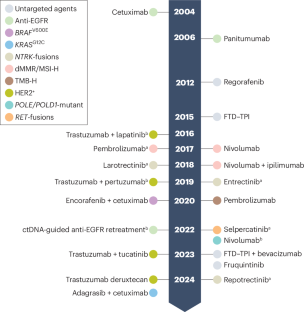转移性结直肠癌患者的晚期治疗方案:综述和循证算法
IF 82.2
1区 医学
Q1 ONCOLOGY
引用次数: 0
摘要
过去几年中,针对难治性转移性结直肠癌患者出现了几种新型全身治疗方法,因此选择最有效的后期治疗方法成为肿瘤内科医生面临的一项挑战。在过去十年中,瑞戈非尼和曲氟嘧啶-替吡拉西尔是唯一可用的药物,与最佳支持治疗相比,它们的临床疗效往往有限。随后改变临床实践的试验结果开辟了几条新的治疗途径,既适用于未经选择的患者(如曲氟啶-替哌嘧啶加贝伐单抗或fruquintinib),也适用于肿瘤中存在可操作改变的亚组(如HER2靶向疗法或KRASG12C抑制剂),或在循环肿瘤DNA中对之前接受的靶向药物没有获得性耐药机制的亚组(如抗EGFR抗体再治疗)。在本综述中,我们全面概述了过去几年中该领域的进展,并从实用角度出发,介绍了如何利用循证算法将最相关的结果转化为转移性结直肠癌患者的日常管理。最后,我们讨论了一些最有吸引力的研究领域,并重点介绍了一些有可能进一步扩大治疗范围的方法。本文章由计算机程序翻译,如有差异,请以英文原文为准。


Late-line options for patients with metastatic colorectal cancer: a review and evidence-based algorithm
Over the past few years, several novel systemic treatments have emerged for patients with treatment-refractory metastatic colorectal cancer, thus making selection of the most effective later-line therapy a challenge for medical oncologists. Over the past decade, regorafenib and trifluridine–tipiracil were the only available drugs and often provided limited clinical benefit compared to best supportive care. Results from subsequent practice-changing trials opened several novel therapeutic avenues, both for unselected patients (such as trifluridine–tipiracil plus bevacizumab or fruquintinib) and for subgroups defined by the presence of actionable alterations in their tumours (such as HER2-targeted therapies or KRASG12C inhibitors) or with no acquired mechanisms of resistance to the previously received targeted agents in circulating tumour DNA (such as retreatment with anti-EGFR antibodies). In this Review, we provide a comprehensive overview of advances in the field over the past few years and offer a practical perspective on translation of the most relevant results into the daily management of patients with metastatic colorectal cancer using an evidence-based algorithm. Finally, we discuss some of the most appealing ongoing areas of research and highlight approaches with the potential to further expand the therapeutic armamentarium. Over the past few years, several novel therapies, including targeted therapies for specific subgroups as well as several non-targeted therapies, have been developed and approved for patients with chemorefractory metastatic colorectal cancer (CRC). Nonetheless, selecting patients who are most likely to benefit from one specific therapy is challenging owing to a lack of direct comparisons of the efficacy of these agents in specific settings. In this Review, the authors summarize the available evidence on the efficacy and safety of later-line therapies for patients with advanced-stage CRC and suggest an evidence-based treatment-selection algorithm.
求助全文
通过发布文献求助,成功后即可免费获取论文全文。
去求助
来源期刊
CiteScore
99.40
自引率
0.40%
发文量
114
审稿时长
6-12 weeks
期刊介绍:
Nature Reviews publishes clinical content authored by internationally renowned clinical academics and researchers, catering to readers in the medical sciences at postgraduate levels and beyond. Although targeted at practicing doctors, researchers, and academics within specific specialties, the aim is to ensure accessibility for readers across various medical disciplines. The journal features in-depth Reviews offering authoritative and current information, contextualizing topics within the history and development of a field. Perspectives, News & Views articles, and the Research Highlights section provide topical discussions, opinions, and filtered primary research from diverse medical journals.

 求助内容:
求助内容: 应助结果提醒方式:
应助结果提醒方式:


